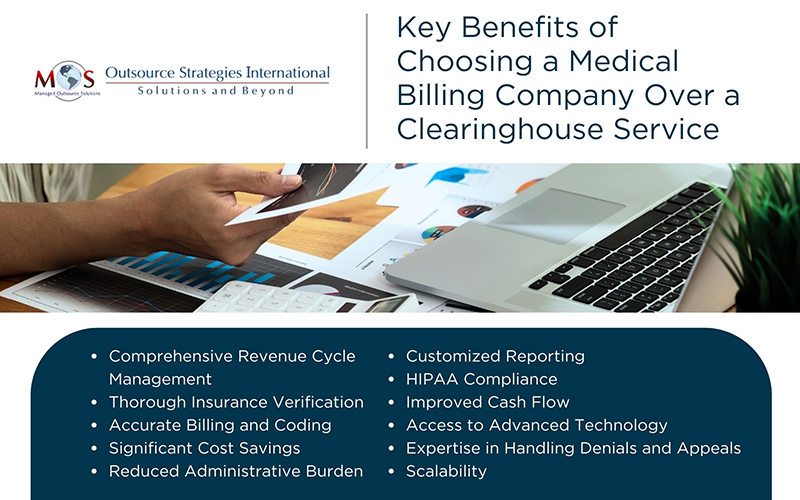What is a Medical Clearinghouse Service?
A healthcare clearinghouse is a third-party service that acts as an intermediary between healthcare providers and payers for processing healthcare transactions. The clearinghouse is responsible for receiving claims from healthcare providers, validating the information, and then transmitting the claims to the appropriate payer in the correct format. Employing the services of a clearinghouse is a strategic choice as it not only validates claim transmission between healthcare entities, but also accelerates payment, ensures compliance, and boosts overall revenue flow for practices.
There are various types of clearinghouses:
- Standard
- Full-service
- Web-based
- EHR-integrated
- Real-time
Using a clearinghouse service helps practices reduce administrative burdens, improve the efficiency of the billing process, and increase the likelihood of timely reimbursement. However, clearinghouses may not fully address customer issues such as claim denials, coding errors, or payer-specific requirements. Working with medical billing experts who tailor solutions to meet a practice’s unique needs can help overcome these challenges by providing targeted support and ensuring a smoother claims process overall.
Key Functions of a Clearinghouse Service
Below are the key functions a clearinghouse service performs to enhance the RCM process:
-
- Claim Scrubbing: They perform a process called “claim scrubbing” to identify and correct errors in claims before claims are submitted to payers. This process includes checking for incomplete data, coding issues, and formatting errors, ensuring that claims comply with payer-specific rules for minimal delays in payment.
- Eligibility Verification: Clearinghouse services verify insurance eligibility in real-time by checking patient details, including active policy status, coverage limits, and potential out-of-pocket expenses. Some services may also provide real-time updates and reports, ensuring that reimbursement is confirmed before care is rendered.
- Claim Transmission: The clearinghouse service reviews, processes, rectifies, and submits claims to the respective payers – be it Medicare, Medicaid, or private insurance companies – through secure electronic channels.
Batch Processing: Clearing houses allow providers to submit multiple claims at once, saving time. - Real-time Updates: Clearinghouses provide real-time tracking of claims, allowing healthcare providers to receive immediate updates on the status of claims. This includes information on whether claims have been accepted, rejected, or require additional information, which aids in quick follow-up and resolution.
Key Benefits of a Clearinghouse Service
Here are the key benefits of partnering with a clearinghouse service for your practice:
-
-
- Error reduction: Employing the services of an intermediary claims management enables meticulous scrubbing of claims, mitigating errors or discrepancies before it reaches payers. This simplifies the transaction process and reduces the chances of claim denials, and ensures accurate reimbursement.
- Improved efficiency: Clearinghouse services navigate the complexities and intricacies of the medical billing system with ease, enabling enhanced operational efficiency. They facilitate seamless payment processes between healthcare entities, reducing delays and ensuring faster claims resolution.
-
However, clearing house services are limited to claims processing and do not handle the entire billing cycle. Providers still need in-house staff to manage patient accounts and follow up on unpaid claims. This is where end-to-end medical billing solutions with patient account management and claim resolution provide a distinct advantage.
Outsourced Medical Billing Services vs. Clearinghouse Services
Both outsourced billing solutions for healthcare providers and clearinghouses handle functions related to the reimbursement process of a healthcare provider, albeit in different ways. A medical billing company oversees the entire billing workflow, managing everything from coding and claim submission to follow-up and payment posting. In contrast, a clearinghouse acts as an intermediary that ensures the accurate electronic transmission, validation, and exchange of claims between providers and payers, helping to streamline and expedite the claims process.
Medical billing companies manage the entire billing process on behalf of healthcare providers, from patient registration to payment collection. They handle everything from charge entry and claims submission to payment posting and accounts receivable management. These services stay updated on coding guidelines and regulations, ensuring compliance and reducing risks of audits. They also provide detailed financial reports and insights into billing processes, helping practices make informed decisions. They have the experience needed to navigate denials and appeals effectively, increasing the likelihood of successful reimbursements.
For healthcare providers, understanding these distinctions between a clearinghouse and outsourced medical billing solutions is essential for optimizing RCM. The key difference is in the scope of services provided, and each option comes with its own set of benefits and challenges. Ultimately, the choice between outsourced medical billing and clearinghouse services depends on the provider’s unique requirements, financial considerations, and level of involvement they want to maintain in managing their medical revenue cycle management (RCM) process.
Ensure accurate, timely billing that maximizes your reimbursements as you focus on patient care!





